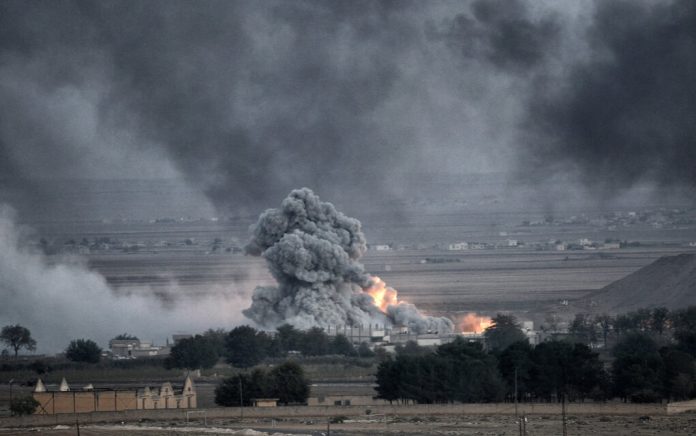
Israel strikes Syrian military airports to counter Turkey’s expanding presence in the region, sending a clear message that could escalate regional tensions between two major U.S. allies.
Key Takeaways
- Israel launched strategic airstrikes on Syrian military airfields, specifically targeting the Hama and T-4 airbases, to counter Turkey’s military ambitions in Syria
- Turkish President Erdogan is attempting to expand regional influence in Syria, reportedly seeking to install air defense systems at Syrian bases
- Syria condemned the Israeli strikes as an “unjustified escalation,” reporting significant damage to infrastructure and casualties
- Israel’s Defense Minister issued a stark warning to Syria’s interim leadership against allowing hostile forces to operate from Syrian territory
- The conflict highlights growing tensions between Israel and Turkey that could potentially draw in other regional and global powers
Israel’s Strategic Airstrikes Target Turkish Ambitions
Recent Israeli airstrikes on Syrian military airfields represent a calculated move to counter Turkey’s growing military presence in Syria. The operations specifically targeted strategic assets at the Hama military airport and T-4 airbase, including runways, fuel storage facilities, radar systems, and weapons caches. According to security analysts, these strikes send a direct message to Turkey to halt its interference with Israeli operations in Syrian airspace. The action comes amid reports that Turkey is attempting to expand its military footprint in Syria, with particular interest in positioning air defense systems at the T-4 base.
The Syrian Observatory for Human Rights reported that the Israeli strikes killed four defense ministry personnel and involved at least 18 separate attacks targeting various military assets. Syrian state media condemned the assault as a violation of international law and called for international pressure against Israel. Israeli ground forces also reportedly engaged in operations in Syria’s Deraa province, resulting in the deaths of nine gunmen and the seizure of weapons caches.
Media: Israel will not allow Turkey to establish air and naval bases in Syria. If Türkiye crosses red lines, Israel will respond. pic.twitter.com/Q1YKcOABgS
— Sprinter Observer (@SprinterObserve) April 4, 2025
Turkey’s Regional Ambitions Alarm Israeli Leadership
Turkish President Recep Tayyip Erdogan’s apparent efforts to position Turkey as a dominant regional power have raised significant concerns in Israel. Security experts suggest Erdogan is capitalizing on the power vacuum left by Russia and Iran to extend Turkish influence throughout Syria. The Turkish president reportedly aims to project power in Syria while seeking to convince the United States to restore access to F-35 fighter jets in exchange for assuming greater responsibility in managing the Syrian situation.
Inside Israel, officials view Turkey’s moves as part of a broader ideological threat, with Erdogan positioning himself as a significant regional power aligned with Islamic ideologies. Israeli Foreign Minister Gideon Saar expressed his government’s interpretation of Turkish ambitions, stating, “They are doing their utmost to have Syria as a Turkish protectorate. It’s clear that is their intention.” These concerns are amplified by Erdogan’s increasingly hostile rhetoric toward Israel, including public prayers for Israel’s destruction that have alarmed both Israeli and American observers.
Diplomatic Tensions and International Implications
Turkey’s Foreign Ministry swiftly condemned the Israeli strikes, accusing Israel of harboring expansionist ambitions and threatening regional security. In a strongly worded statement, the ministry characterized the Israeli operations as unprovoked and dangerous. The war of words escalated as Israeli Defense Minister Israel Katz issued a direct warning to Syria’s interim President Ahmed al-Sharaa against permitting hostile forces to operate from Syrian territory.
Former U.S. Ambassador Eric Edelman has called for diplomatic intervention to address Turkey’s rhetoric and actions, suggesting that any renewed F-35 sales to Turkey should come with strict conditions regarding their use. The situation raises the risk of a broader regional confrontation, with Syria potentially becoming a battleground for external powers. Domestic challenges also factor into the equation, as rising public protests within Turkey may indicate that Erdogan’s aggressive foreign policy stems from a position of domestic vulnerability rather than strength.
Syrian Response and Regional Impact
Syria’s foreign ministry labeled the Israeli strikes a flagrant violation of international law and Syrian sovereignty. Officials reported significant damage to the Hama airbase and injuries to dozens of military personnel. These strikes coincide with reports of Turkey moving jets and air defense systems to Syrian airbases, further complicating an already volatile situation. Since the overthrow of Bashar al-Assad’s regime, Israel has conducted numerous strikes in Syria with the stated aim of eliminating military assets that could threaten Israeli security.
The ongoing situation threatens to transform Syria into an arena for proxy conflicts between regional powers, with civilian populations caught in the crossfire. The complex dynamics involving Turkey, a NATO member, Israel, Syria, and potentially other actors including Russia and the United States create significant challenges for maintaining regional stability. As tensions escalate, diplomatic efforts to de-escalate the situation become increasingly urgent to prevent a broader conflict that could further destabilize the Middle East.









